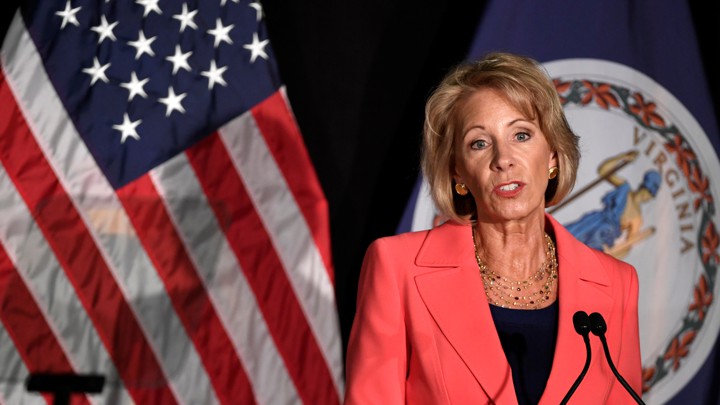
“Universities reacted with panicked over-compliance,” argues the Harvard Law professor Jeannie Suk Gersen. “In renewing their attention to the rights of alleged victims of sexual assault, many began to disregard the rights of accused students … It has become commonplace to deny accused students access to the complaint, evidence, the identities of witnesses, or the investigative report, and to forbid them from questioning complainants or witnesses.”
The civil-liberties organization published a tweet complaining that DeVos’s proposal would “tip the scales” against accusers. “The proposed rule would make schools less safe for survivors of sexual assault and harassment,” it said. “It promotes an unfair process, inappropriately favoring the accused and letting schools ignore their responsibility under Title IX to respond promptly and fairly to complaints of sexual violence. We will continue to support survivors.”
At the time I published a critique, “The ACLU Declines to Defend Civil Rights,” that asked, “Since when does the ACLU believe a process that favors the accused is inappropriate or unfair?” Many other civil libertarians objected, too.
So I was pleasantly surprised last week to read the more formal, official comment that the ACLU submitted to the Department of Education. As the Brooklyn College professor K. C. Johnson observed, the ACLU’s lengthier, more considered statement is strikingly different from its earlier social-media reaction. It encompasses significant criticisms of the new rule, many of which warrant attention.
But on matters of due process, it aligns more closely with the Trump approach than the Obama approach, bolstering rather than weakening vital procedural protections.
“The ACLU supports many of the increased procedural protections required by the Proposed Rule for Title IX grievance proceedings, including the right to a live hearing and an opportunity for cross-examination in the university setting, the opportunity to stay Title IX proceedings in the face of an imminent or ongoing criminal investigation or trial, the right of access to evidence from the investigation, and the right to written decisions carefully addressing the evidence,” it states.
Read: The uncomfortable truth about campus rape policy
It urges a requirement that universities “provide counsel for both parties for the hearing if either party requests counsel.” And it questions the ascendant notion that protections for accused students and justice for victims are at odds:
Conventional wisdom all too often pits the interests in due process and equal rights against each other, as though all steps to remedy campus sexual violence will lead to deprivations of fair process for the respondent, and robust fair process protections will necessarily disadvantage or deter complainants. There are, however, important ways in which the goals of due process and equality are shared. Both principles seek to ensure that no student—complainant or respondent—is unjustifiably deprived of access to an education. Moreover, both parties (as well as the schools themselves) benefit from disciplinary procedures that are fair, prompt, equitable, and reliable.
At the same time, the ACLU still objects to the way that the proposed rule grants colleges the discretion to decide whether the burden of proof in sexual-misconduct disciplinary hearings should follow the “preponderance of the evidence” standard, requiring a 50.1 percent chance that the charges are accurate, or a “clear and convincing evidence” standard, a higher burden of proof.
“The preponderance standard is the appropriate standard of proof to apply for complaints involving peer-on-peer harassment or disputes, including Title IX grievance proceedings, for two reasons,” the ACLU continues. “First, it ‘is the burden of proof in most civil trials’ and requires the factfinder to determine that the complaint is more likely true than false … Second, the preponderance standard makes sense because it treats the complainant and the respondent equitably. That is why it is used in civil litigation, where there is no ex ante reason to favor one side over the other.” Notice that technically, even the preponderance standard favors the accused, insofar as they prevail in cases where the evidence for and against guilt are exactly 50 percent in both directions. (Elsewhere, the presumption of innocence itself is now being attacked.)
Caitlin Flanagan: Mutually nonconsensual sex
The ACLU goes on to argue that a “clear and convincing” standard “tips the scales against the complainant,” adding that “in Title IX grievance or disciplinary proceedings, both the complainant and the respondent have a significant interest in access to education. Serious disciplinary sanctions will undoubtedly affect a respondent’s access to education. And, as the Department acknowledges, a school’s failure to address sexual harassment or assault will affect the complainant’s access to education.” Thus, it concludes, “A preponderance standard provides the most equitable approach for resolving the complainant’s and respondent’s equal interests in access to education.”
I still think the ACLU has this wrong. That intuition flows in part from my understanding of 50.1 percent. Imagine that a roulette table appears in your garage. You’re obligated to cover the bet of the first passerby. Yikes! For numbers one through 36, half are red and half are black. And then there’s zero, which is green.

A neighbor walks in, puts $1,000 on black, and demands that you spin the wheel. The odds are slightly in your favor. You’d be correct to conclude that you’re more likely than not to win. Now think of your confidence level that you will win as that wheel is spinning, but before the ball settles into its ultimate slot.
The ACLU’s argument also posits a false symmetry. While the educational access of both accusers and respondents are indeed implicated in Title IX hearings, there are relevant differences, too. A wrongly accused student who is expelled utterly loses access to an education, whereas a victim doesn’t necessarily lose access to an education if a respondent is wrongly acquitted, in part because punishing a given perpetrator is not the only tool at a college’s disposal for safeguarding the educational access of victims.
Read: The bad science behind campus response to sexual assault
Finally, an acquittal under a “preponderance of the evidence” standard may be harder on some accusers than an acquittal under a “clear and convincing evidence” standard, because only the former will strike many as implying an unreliable accuser. The latter better enables adjudicators to find someone not responsible without seeming to say that the accuser is more than likely a liar. That difference could conceivably spare some innocents a wrongful conviction, too, because some adjudicators are averse to implying that any accuser did something wrong or deceitful by coming forward with a claim of sexual misconduct.
These are the thorniest of questions, and neither approach to determining the burden of proof will yield the optimal outcome in all cases. People of goodwill who are genuinely concerned with the rights of accusers and respondents are on both sides of this debate.
And that strikes me as a final argument against the ACLU’s position. That is to say, because this is a tough question about which reasonable people can and do disagree, it makes sense to give different educational institutions leeway to adopt different burdens of proof. Perhaps the relevant tradeoffs vary with local circumstances in a way that makes different standards right for different institutions. Or perhaps a diversity of approaches is the best way to evaluate which burden is best and ought to be adopted universally at some point in the future.
Regardless, I suspect that the legislators who passed Title IX would agree that in doing so, they had no intention of prohibiting a “clear and convincing evidence” standard in campus disciplinary matters involving sexual misconduct. The thorny tradeoffs, with implications for access to education on both sides, are such that private institutions should be free to do what’s best as they see it rather than being coerced by the changing whims of a politicized central authority.
We want to hear what you think about this article. Submit a letter to the editor or write to letters@theatlantic.com.
